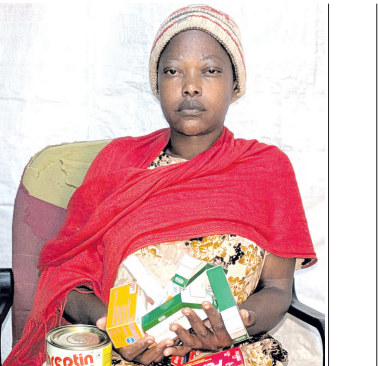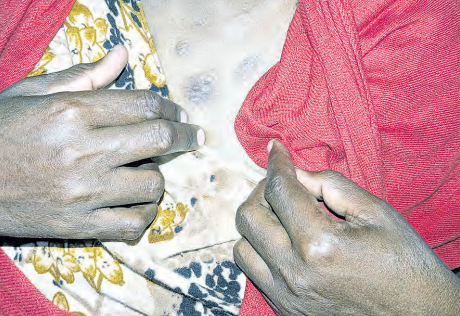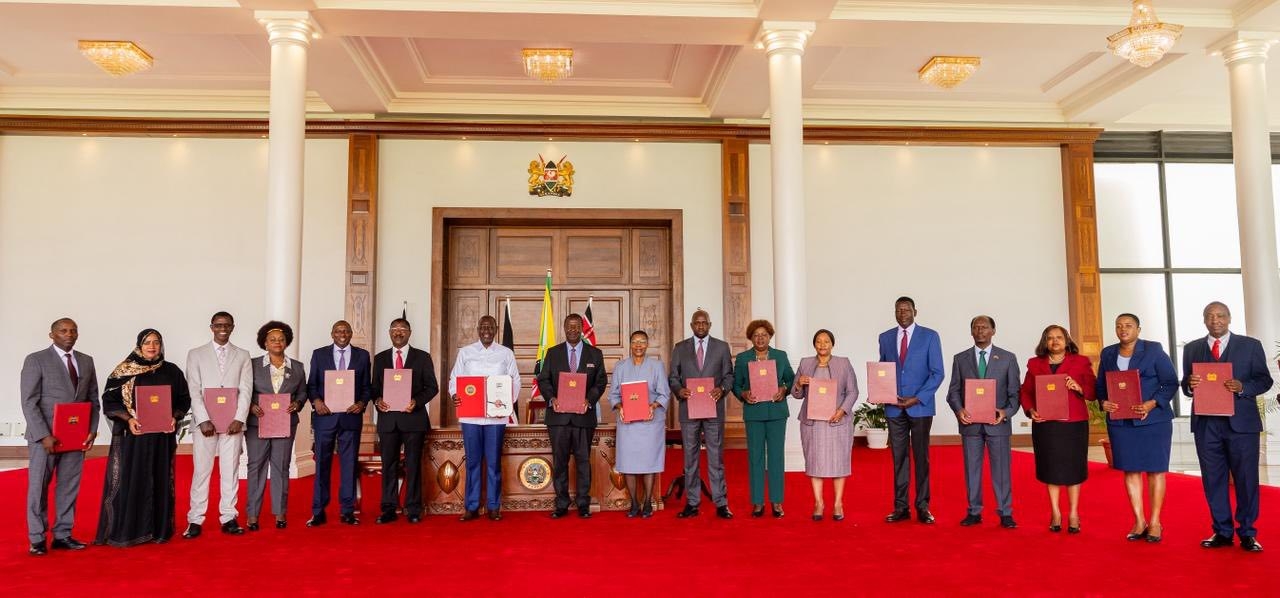
Pamela Aoko is trapped in a life she never imagined because of a bullet she has lived with for 17 years in her chest.
“I can’t eat, and if I don’t, I vomit blood,” she says in pain. Aoko, who hails from Lindi, Kibra, has spent years living in physical and emotional agony as she battles the aftermath of the 2007-08-post election violence.
She used to have a business that supported her family until the post-election violence shattered her life. On this Tuesday afternoon, while the streets of Kibra bustle with life, Aoko remains cooped up in her house, unable to carry out even the simplest tasks due to the devastating effects the bullet has had on her.
Her life was changed forever on December 31, 2007. Aoko, then pregnant, was hosting a ‘chama’ in her home, and she was waiting for her fellow chama members to come.
However, in a flash, a bullet pierced her left breast and everything around her crumbled. “In an instant, dust filled the air and I collapsed,” she recalls, her voice breaking as the memory resurfaces.
“When my neighbours found me later, I could feel the sharp pain and realised I had been shot. I lost my baby.”
In the chaos of post-election violence, Aoko was rushed to hospital but the care she so desperately needed was delayed. She was forced to wait for hours without treatment.
And when the surgery she needed did not happen due to a lack of funds, her nightmare deepened.
APPEAL FOR HELP
The bullet has remained lodged in Aoko’s chest since then, a constant reminder of a past she can never forget.
“Before this, I was a businesswoman,” she says as she fights back tears. “But now, I beg for food to feed my children.”
The bullet in her body not only caused immense physical pain but also triggered health issues: thyroid problems, heart disease and kidney issues.
“I take 37 pills a day just to survive,” Aoko says, her eyes filled with tears. “Without them, I can’t even walk.” What’s worse, the dream of a better future for her children is fading away.
Her eldest child, who earned a B+, is stuck home because she can’t afford her school fees. “I can’t even provide for them,” Aoko says.
“I want so much for them but my life is a constant struggle.” Doctors say the bullet can be removed but only after her thyroid is treated. Yet Aoko’s blood count is dangerously low, at six pints, and the required surgery costs Sh2.5 million.
“How can I raise that kind of money?” she asks, her voice filled with despair. “Every day, I pray for a miracle. I just want to live. I want to see my children grow. I want to be there for them. Please, help me get this bullet out of me so I can move on.”
In her troubles, an old colleague of hers has been a pillar of support. “I have a friend I used to work with. There are days she sends me omena, which I then sell to ensure I feed my children and even buy medicine just to keep pushing on with life,” she says.
She says if I could get a Good Samaritan to help her set up a business then have the bullet removed, she would really work hard.
“I am appealing for help from fellow Kenyans. They can send any support to my number, 0715 688 977, under the name Pamela Aoko Ndhiwa.”
St John Ambulance principal surgeon Dr Gome Lenga says remaining with a bullet in your body has some negative effects that can affect your health.
“The potential medical risks or complications associated with leaving a bullet in the body for long, depend on the site of the lodged bullet,” he says.
“Complications are mainly chronic infections of the area, pain and involvement of other structures that were not involved at first.”
Dr Gome says some circumstances might make doctors decide if it’s safer to remove the bullet or not. He says if removing the bullet will cause more damage due to the structures one will encounter as they attempt to remove it, then it is advisable that it is not removed.
Dr Gome says the body’s immune system responds to a foreign object, such as a bullet, over time. “The body will cause fibrosis around the bullet as part of the reaction to try and isolate the foreign material,” he says.
Fibrosis is the thickening and scarring of connective tissue usually as a result of injury. Dr Gome says if there is increased pain, bleeding or swelling, then the retained bullet could be causing harm.

CASUALTY NUMBERS
A Commission of Inquiry into the Post-Election Violence found that 1,133 people died as a consequence of the turmoil.
According to the report, gunshots accounted for 962 casualties, 405 of whom died. “This represented 35.7 per cent of the total deaths, making gunshot the single most frequent cause of deaths during post-election violence,” the report stated.
Jackline Mutere founded Grace Agenda, an organisation advocating for survivors of election-related sexual violence.
She says some survivors of sexual violence during the 2007-08 post-poll elections are yet to receive reparations.
“What happens to these survivors? What happens to the children born out of rape?” she asked. There has been progress in addressing gender-based violence in Kenya, including the establishment of a GBV information system and the introduction of a GBV module in the Kenya Demographic and Health Survey.
However, Mutere emphasised that survivors of post-election violence have been overlooked. Mutere expressed concern for the ongoing trauma experienced by survivors and highlighted the critical need for psychosocial support services.
She also underscored the significance of initiatives and programmes that promote reconciliation, healing and social cohesion. Mutere, also a survivor of post-election violence, was violated during that time.
“I was violated by a person who had come to seek refuge in my house. Months later, I discovered I was pregnant,” she says. “I even tried doing an abortion three times but I was not successful, so I ended up keeping the child.
“My daughter is now 16. During my healing, I went through counselling and I met many women and girls who had been violated.”
Mutere says her experience led her to starting her CBO, Grace Agenda.
SMALL WINS
Utu Wetu Trust executive director Yvonne Oyieke says they work closely with survivors.
“We work with partners, and that helps us connect to ensure the survivors get medical and psychosocial support because of what they have experienced,” she says.
“We have Petition 122 of 2013 and direct contact with eight individual petitioners who are survivors.” In the petition, the High Court found that the government was responsible for “failure to conduct independent and effective investigations and prosecution of sexual gender-based violence-related crimes during the post-election violence”.
Four of the eight survivor petitioners in the case were each awarded a compensation of Sh4 million “for the violation of their constitutional right”.
The High Court in Nairobi found a “violation of the Kenyan state to investigate and prosecute violations of the rights to life, the prevention of torture inhuman and degrading treatment and security of the person”.
Oyieke says they do legal advocacy and in 2021-22, they implemented a project that sought to put in place several measures and engage different duty bearers on election-related sexual violence. Oyieke says even as they help survivors get justice, they encounter challenges.
“When a new government comes in, there are always challenges with pushing several agendas because the process is complex,” she says.
“Despite that, we have some success stories in our quest for justice to these survivors. In petition 122 of 2013, four of the eight survivor-petitioners in the case were each awarded. This is something positive, though we are still following up, more needs to be done.”
On laws and policy, Oyieke says Kenya is heavy on such. “We have a solid legal framework when it comes to protection against sexual gender-based violence. There are policies in place that can be used to ensure survivors have equal access to justice, but the challenge is the implementation and the issue to do with reparation,” she says.
Despite that, she wants survivors to know that the wheels of justice may turn slow but organisations such as Utu Wetu remember the mass violations and are willing to help.
Those who need help can always reach out, she says. When reached for a comment on the Petition 122 of 2013, Attorney General Dorcas Oduor said, “Unfortunately, I am not seized of the facts of this case. I will need time to acquaint myself with the status and progress.”
For support - 0715 688 977












